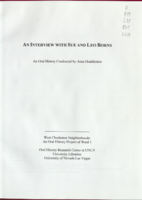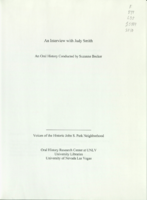Search the Special Collections and Archives Portal
Search Results

Transcript of interview with Leo Borns and Sue Easley Borns by Anna Huddleston, March 21, 2014
Date
Archival Collection
Description
Leo and Sue (Easley) Borns came to Las Vegas in 1962 to begin an architectural career that would last forty-four years in Southern Nevada. Leo Boms worked for various firms in Las Vegas before developing a reputation as "F. Borns, Architect". He has gone on to design buildings for state public works, Clark County, the City of Las Vegas, Clark County School District, churches, and private home owners. Rarely taking a job outside of Southern Nevada, Leo Boms' intent was to develop an architecture considered indigenous to the area while keeping the conservation of energy and technology as prime importance. Mr. and Mrs. Boms, after living in the area for approximately five years, decided to purchase a home on Strong Drive in McNeil Estates where they raised their three children. Active in social and philanthropic organizations, both Leo and Sue have become acquainted with numerous area personalities. Mr. Boms is most proud of being a part of the development of the Kiwanis Water Conservation Park although his structural designs can be seen throughout the Southern Nevada area. At the age of 77, he closed his office but remains an integral influence on the Greater Las Vegas area.
Text

Transcript of interview with Judy Smith by Suzanne Becker, November 22, 2008
Date
Archival Collection
Description
Judy Smith was a teenager when her family relocated from Barstow, CA to Las Vegas in 1958. It was a wide open setting, an ideal location for riding her horse. It was also an era of growth as the city became a gambling destination and the Strip became dotted with early casinos and hotels. Judy attended Las Vegas High School, worked for the Las Vegas Sun and earned a scholarship to UNR. By 1967, she was married and moving back to Vegas with her young family. They chose the John S. Park Neighborhood as the place to call home. For Judy living in John S. Park is about a "sense of place" and "a sense of timelessness." She describer the evolution of the neighborhood and the greater Las Vegas community from the pioneers to the contemporary leaders. In 2006, Judy's home was gutted by a fire. Her life was saved by an observant neighbor. She could have relocated at the time, but chose not to move from the area that she has called home for over 40 years.
Text

Jack K. Leavitt interview, February 28, 1979: transcript
Date
Archival Collection
Description
On February 28, 1979, collector Alick Dziabczenko interviewed Jack Leavitt in Las Vegas, Nevada. In this interview Mr. Leavitt talks about his childhood in Las Vegas. He also talks about his family life and his career in the city, as well as some of the many changes he has seen in Las Vegas.
Text

Relda W. Leavitt interview, March 18, 1976: transcript
Date
Archival Collection
Description
On March 18, 1976, collector David Steele Broussard interviewed Relda Whitney Leavitt (born April 3rd, 1917 in Saint Thomas, Nevada) at her home in Las Vegas, Nevada. In this interview, Mrs. Leavitt discusses growing up in Saint Thomas, Nevada before her family moved to Las Vegas. She also discusses moving to Las Vegas, Nevada and her family’s dairy business in Whitney, Nevada. She speaks about the different changes and growth she has seen in Las Vegas over the years.
Text

Al Lermusioux interview, March 9, 1978: transcript
Date
Archival Collection
Description
On March 9, 1978, Shirley Dianne Long interviewed Al Lermusiaux (b. 1926 in Corrales, New Mexico) about his work in construction in the Las Vegas Valley. Lermusiaux begins by talking about his move to Las Vegas, his family and what brought him to the city. He shares many anecdotes about the construction of different iconic buildings in Las Vegas, the inner workings of the business, payments to employees and the changes in technology. Lermusiaux, in particular, talks of the telephone system in the fifties and the changes in structures and their regulations. During his interview, Lermusiaux lays out an image of old Las Vegas and Henderson, giving detailed descriptions of the layout of the city, the projects he worked on and the effects of the weather on building structures in Las Vegas.
Text

Transcript of interview with Jim Marsh by Claytee D. White, June 5, 2012
Date
Archival Collection
Description
Jim Marsh in Denver, Colorado. Father was the chief for the Colorado Patrol. Mother lived in Nebraska. Jim split time in both places while growing up. He was a service member of the Army and once getting out of the service he started his work with his father at a Ford dealership. Jim went on to work and own dealership in several different areas, Colorado, California, New Mexico, and Washington states before arriving in Las Vegas, NV in 1971. Once arriving in Las Vegas Marsh purchased a dealership called American Auto Mart. Around 1976 Jim Marsh bought the Santa Fe Saloon along with the twenty lots surrounding it for 12,500. This was his first experience in the gaming industry Marsh was the only dealership in the world for 25 years to have a gaming license in a new-car dealership. Marsh discovered interest in Belmont when there was a lone resident Rose Walter. The two bartered and Jim gained land in Belmont and went on to build a bar and church for the town. Marsh eventually went on to own the Skyline Casino. Jim Marsh founded the Nevada Auto Auction in 1987 on Las Vegas Boulevard South Eventually sold it and used the investment to build the Longstreet Casino. Marsh was' also a member of business organizations, Better Business Bureau and The Red Cross Marsh has been a member of the Salvation Army Advisory Board for at least 25 years. Tonopah is another location that Marsh has invested in. After leasing the gaming at the Mizpah Hotel to later buying the Valley Bank building and moving the gaming from Mizpah. It is still successful today. He also purchased the Tonopah Station House which is a hotel bar, and restaurant; along with owning the grocery store Scolari's next-door. Tonopah has proved to be a very good investment for Jim Marsh.
Text

Nanyu Tomiyasu interview, April 12, 1977: transcript
Date
Archival Collection
Description
On April 12, 1977, collector Mark French interviewed Nanyu Tomiyasu (born May 28th, 1918 in Las Vegas, Nevada) at the University of Nevada, Las Vegas. In this interview, Nanyu Tomiyasu discusses growing up and working on his father’s (Bill Yonema Tomiyasu) farm in Las Vegas, Nevada. He also discusses how his father came to Las Vegas and being one of the few Japanese families in Las Vegas as a child.
Text

Transcript of interview with Ed Fleming by Mark Lucas, February 8, 1977
Date
Archival Collection
Description
On February 8, 1977, Mark Lucas interviewed Edmund “Ed” Fleming (born 1915 in Virginia, Minnesota) about his experience in Southern Nevada. Fleming first talks about his moves to and from Nevada before describing the mining practices within the small towns in Southern Nevada. He also talks about his experience as a teacher in Pahrump and Goodsprings and his eventual move to Las Vegas, where he continued in the educational field. Fleming also talks about religion, transportation, funding for education, inflation, and cultural arts as they all relate to Las Vegas.
Text

Transcript of interview with Kathleen Bryan Gaston by Niki Rodriguez, March 17, 1981
Date
Archival Collection
Description
On March 17, 1981, Niki Rodriguez interviewed Kathleen Bryan Gaston (born 1949 in Las Vegas, Nevada) about her experience living in Southern Nevada. Gaston first talks about her father who moved to Las Vegas and eventually became a justice of the peace, and she also describes how her parents eventually moved to Las Vegas. Gaston later describes how Las Vegas looked as she was growing up and how it has developed since, specifically mentioning the schools she attended and the growth of the Las Vegas Strip.
Text

Transcript of interview with Agnes Gauger by Coleen Mancini, February 24, 1977
Date
Archival Collection
Description
On February 24, 1977, Coleen Mancini interviewed the claims manager for the Culinary Workers and Bartenders Insurance Fund, Agnes Gauger (born Coleen Evans on November 21, 1926 in Arkansas) in her home in Las Vegas, Nevada. Mrs. Gauger’s daughter, Traci Sturdivant was also present during the interview. This interview covers significant changes and growth in Southern Nevada, including gambling and other industries, family life and recreation, and early atomic tests. Mrs. Gauger also discusses housing in the Las Vegas, Howard Hughes, McCarran Airport, medical facilities and education in Southern Nevada.
Text
